
The Democratic Republic of Congo (DRC) recently joined the East African Community (EAC). Soon after, the EAC member states met in Kenya to address conflict in the mineral-rich Eastern DRC that has witnessed many armed conflicts in the past two decades.
There is a transnational struggle to stop human rights violations within the context of mining certain conflict minerals, including Coltan in the DRC. Coltan is considered a conflict mineral alongside Tin, Tungsten, Tantalum and Gold. They are so-called because their exploitation and trade contribute to human rights violations in the country of extraction and surrounding areas.